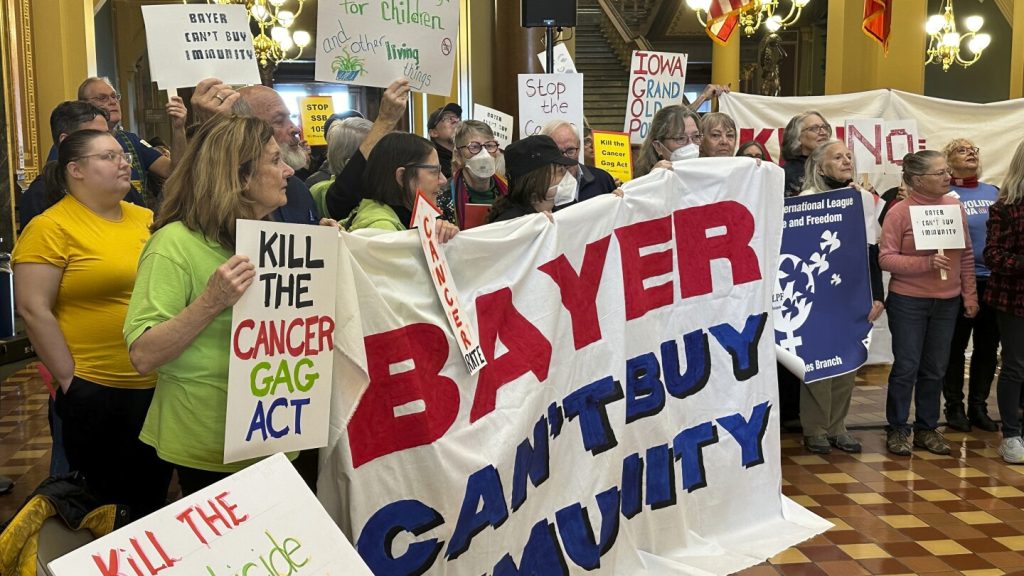Bayer’s Efforts to Shield Itself from Roundup Lawsuits Spark Protests and Debate
Dozens of protesters gathered at the Iowa Capitol building on Monday to voice their opposition to a legislative proposal backed by Bayer, the chemical giant, aimed at protecting itself and other pesticide companies from lawsuits claiming that the weedkiller Roundup causes cancer. The proposed legislation, which is pending in Iowa and at least seven other states, would prevent individuals from suing pesticide companies for failing to warn consumers about the potential health risks of their products, provided the product labels comply with U.S. Environmental Protection Agency (EPA) regulations.Critics argue that this would strip individuals of their right to hold corporations accountable for harm caused by their products, while Bayer and its allies insist that such protections are necessary to ensure the continued availability of glyphosate-based weedkillers, which are critical to American agriculture.
Opposition Grows as Protesters Share Personal Stories of Cancer and Loss
Speakers at the protest shared heartbreaking stories of family members diagnosed with cancer, emphasizing the need for accountability from corporations like Bayer. Nick Schutt, a part-time farmer from Iowa, highlighted the personal toll of cancer in his family, stating, "I feel like we need accountability here in Iowa. At the end of the day, multinational chemical companies like Bayer should be held accountable." Schutt’s mother, father, aunt, and two siblings have all faced cancer diagnoses, and he believes that companies like Bayer should not be shielded from lawsuits if their products are found to cause harm.
Bayer has faced approximately 177,000 lawsuits alleging that Roundup causes non-Hodgkin lymphoma, a type of cancer, and has set aside $16 billion to settle cases. However, the company disputes the claim that Roundup is carcinogenic, pointing to EPA assessments that glyphosate, the active ingredient in Roundup, is "not likely to be carcinogenic to humans" when used as directed. Despite this, the sheer number of lawsuits and the financial burden they impose have led Bayer to seek legal relief from lawmakers, warning that the continued viability of Roundup in the U.S. market is at risk.
Roundup’s Role in Agriculture and the Economy
Bayer and its supporters argue that Roundup is indispensable to modern agriculture, particularly for crops like corn, soybeans, and cotton. The weedkiller is designed to work with genetically modified seeds that resist its effects, allowing farmers to increase yields while reducing the need for tilling, which helps preserve soil health. Liza Lockwood, Bayer’s medical affairs lead in its crop science division, described Roundup as "the most important product in global agriculture" during a recent Missouri Senate committee hearing. Farmers like Kevin Ross of southwest Iowa echoed this sentiment, explaining how Roundup has improved soil quality, reduced water runoff, and helped farmers stay profitable over the past 50 years.
However, critics counter that the importance of Roundup does not justify shielding Bayer from accountability. They argue that the proposed legislation would set a dangerous precedent by allowing corporations to avoid responsibility for the potential health risks of their products, even if those risks are not explicitly acknowledged by the EPA. Richard Deming, a cancer physician in Des Moines, noted that it often takes decades to establish a definitive link between long-term chemical exposure and cancer, and he warned that public policy should focus on mitigating risks rather than granting corporations "immunity from responsibility."
Expanded Legislative Efforts and Controversial Advocacy Tactics
Bayer’s push for legal protections has expanded beyond Iowa to include at least seven other states, with bills already passing in North Dakota and advancing through legislative committees in Mississippi, Missouri, and other states. The company is supported by a coalition of agricultural groups, including the Modern Ag Alliance, which has launched a media campaign emphasizing the critical role of glyphosate-based weedkillers in agriculture. In a controversial move, the Protecting America Initiative, a group tied to former Trump administration official Richard Grenell, has also joined the effort, running a Super Bowl ad in Missouri that linked the legislation to combating Chinese influence over the U.S. food supply. The group has invested significant funds to air the ad in Missouri and Iowa, and it stationed a truck with a portable billboard outside the Iowa Capitol to promote the bill.
Thescientific Debate Over Glyphosate and Cancer
At the heart of the debate is the question of whether glyphosate, the key ingredient in Roundup, causes cancer. While the EPA has determined that glyphosate is not likely to be carcinogenic when used as directed, some studies have suggested a link between long-term exposure to glyphosate and non-Hodgkin lymphoma. Attorneys involved in lawsuits against Bayer, including Robert F. Kennedy Jr., a high-profile environmental advocate and Trump’s nominee for secretary of Health and Human Services, argue that the company failed to adequately warn consumers about these risks. Bayer, however, maintains that the science supports the safety of its product and that the lawsuits are unfounded.
The proposed legislation would effectively preempt these lawsuits by granting legal immunity to pesticide companies whose product labels comply with EPA regulations. Critics like Dr. Deming warn that this could have far-reaching implications, not just for Roundup but for other agricultural chemicals as well. They argue that relying solely on EPA labeling for legal immunity ignores the complexities of chemical safety andmay leave consumers without recourse if they are harmed by a product.
The Broader Implications for Farmers, Consumers, and the Economy
As the debate over the legislation continues, the stakes are high for farmers, consumers, and the broader economy. Supporters of the bill warn that losing access to Roundup could force farmers to rely on less effective or potentially unsafe alternatives, including Chinese-made weedkillers. They argue that this would not only harm American farmers but also undermine the nation’s food security. Opponents, however, insist that public health and corporate accountability must take precedence over economic interests.
The outcome of this legislative battle will have significant implications for how chemical companies are held responsible for the safety of their products. While Bayer and its allies frame the issue as a matter of economic survival and food security, critics see it as a test of whether corporations can evade accountability for the potential harm caused by their products. As the debate unfolds, the voices of farmers, consumers, and lawmakers will shape the future of agricultural chemicals and the legal protections afforded to the companies that produce them.








